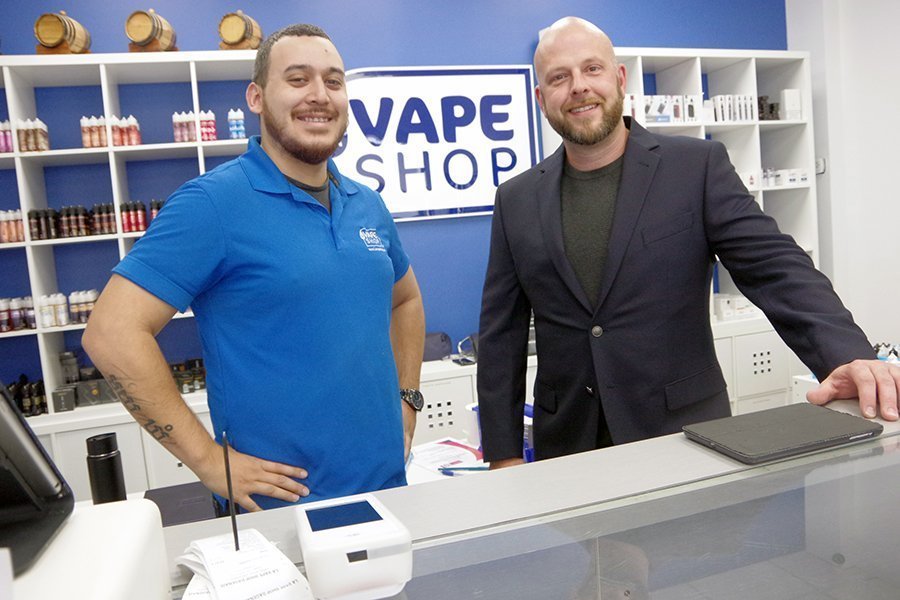Martin C. Barry

The head of Canada’s largest chain of vaping supply shops says he isn’t concerned about a wave of negative publicity that has impacted the vaping industry. All the same, he and other vaping shop owners have launched a trade association to counter what they regard as misinformation.
With headquarters on Dagenais Blvd. in Laval, Daniel Marien’s La Vape Shop chain will soon have 40 outlets, making it the nation’s largest company of its kind, Marien maintains. La Vape Shop was founded by Marien seven years ago along with two partners.
New trade association
The Vaping Industry Trade Association (VITA), which was launched in September, claims to be Canada’s largest such grouping for the industry’s manufacturers, importers, distributors and retailers. Marien sits on the VITA board and is the organization’s spokesperson for Quebec.
If some of the media coverage vaping has received lately is an indicator, VITA has a considerable amount of work ahead. Both Time magazine in the U.S. as well as Maclean’s magazine in Canada recently had major coverage of vaping – in Time’s case a feature that described it on the magazine’s cover as The New American Addiction.
“What’s needed at this time is for the electronic cigarette business to work with the government and to have the proper information, reports and studies delivered the proper way,” Marien said in an interview with Newsfirst Multimedia.
Pros and cons of vaping
Although there has been support for as well as criticism of vaping by public health officials and parents of teens who have become regular users of electronic cigarettes, there is general agreement that there are positive and negative aspects to vaping. However, while vaping is now accepted as a far safer alternative to tobacco smoking, it is nonetheless addictive.
And then of course there are the cases over the past few months of respiratory illness associated with vaping. Initially reported in the U.S., a first case surfaced in Canada this past September.
One of the largest stakeholders, the U.S.-based e-cigarette maker Juul with an estimated market value of $38 billion and a more than 50 per cent share of the Canada and U.S. vaping market, is facing devastating publicity as well as calls for much stricter government oversight of the e-cigarette industry.
‘Big tobacco’ on VITA board
While Marien said La Vape Shop hasn’t been significantly affected by the news, he added that VITA has nonetheless seen the necessity to step up its public relations efforts. Just as Juul is now 35 per cent owned by the multinational Altria tobacco corporation, VITA’s board has three “big tobacco” representatives, three major players from the vaping sector, as well as other members with smaller interests, according to Marien.
On Sept. 27, VITA issued a statement saying it is “closely following the Centers for Disease Control and Prevention (CDC) investigation into cases of respiratory illnesses in the United States.” The association noted that initial findings pointed to most cases of respiratory illness being linked to the use of illicit vaping liquids containing unregulated cannabis oil (THC) as well as vitamin E acetate solvent.
Says incidents THC-related
Marien said he personally agreed with the findings. He pointed out that the THC cartridges in question are currently illegal and available only through the black market.
“Eighty-five per cent have been proven without a doubt that they are related to illegal THC cartridges,” he said. “The product inside these has oil-based product that can’t be vaporized. When you are inhaling some kind of oil like this, that oil can sit on your lungs. It’s not the same product as an electronic cigarette product. It’s totally two different things.”
He also noted that over the past decade when vaping grew so much in popularity, there hadn’t been any reports like the ones that came up recently, which only seemed to occur with the clandestine introduction of the THC cartridges.
‘Black market’ distribution
Although officials in the U.S. have since shut down the producer of the cartridges, Marien pointed out that the illicit product (‘Dank’) was “branded” and the company had a large black market distribution network in place which was growing quickly.
According to Marien, current Canadian law allows e-cigarette manufacturers to use only propylene glycol, glycerine, flavouring and nicotine. The law does not allow them to add ingredients containing psychoactives, energetics or vitamins.
Marien maintains that vaping is scientifically proven to be safer than smoking because it doesn’t involve combustion – which is the main culprit when tobacco is consumed through cigarettes.
“The problem is that when you’re burning anything, whether it’s tobacco, leaves or wood, the combustion creates thousands of chemicals,” he said. “That’s the difference between combustion and vaporization.”



